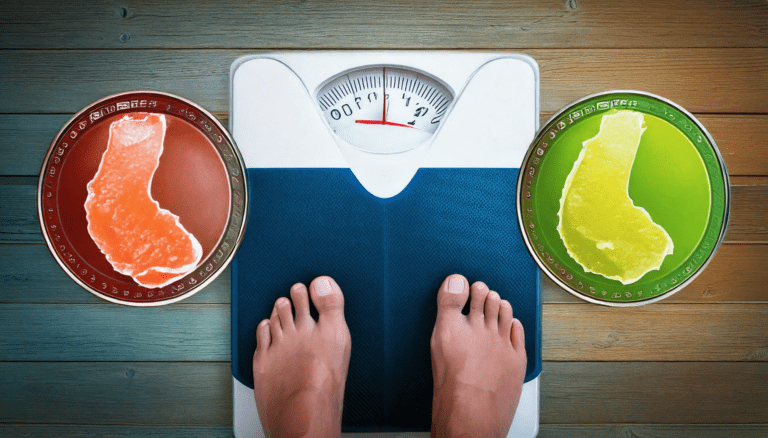Artificial sweeteners and weight gain—two terms you wouldn’t normally expect to see together. After all, these sugar substitutes are marketed as the healthier option for weight loss, offering sweetness without the calories. However, recent research reveals that artificial sweeteners may be doing more harm than good when it comes to managing your waistline. Instead of helping with weight loss, these sweeteners could be leading to weight gain and even disrupting your metabolism. In this article, we’ll dive deep into the connection between artificial sweeteners and weight gain, and explore why sugar-free might not always be the healthiest choice.
Summary
Artificial sweeteners, such as aspartame and sucralose, may contribute to weight gain by increasing cravings and disrupting metabolism. Though marketed as sugar-free, they can lead to overeating and fat storage, making them less ideal for weight management than expected.
How Artificial Sweeteners Are Supposed to Work
Artificial sweeteners are designed to provide sweetness without adding calories. The idea is simple: by replacing sugar with low- or zero-calorie alternatives, you can reduce your overall calorie intake and manage your weight more effectively. Popular sweeteners like aspartame, sucralose, and saccharin are commonly found in sugar-free products such as diet sodas, candies, and even snacks.
These sweeteners are particularly appealing for people with diabetes or those aiming to control their blood sugar levels. Because artificial sweeteners don’t cause blood sugar spikes, they seem like a perfect substitute for sugar. However, despite their calorie-free label, recent studies have raised concerns about the relationship between artificial sweeteners and weight gain, suggesting that these substitutes may not work as intended.
The Link Between Artificial Sweeteners and Weight Gain
The growing body of research linking artificial sweeteners and weight gain is challenging the assumption that these products help with weight loss. Although they contain no calories, artificial sweeteners may interfere with the body’s natural ability to regulate hunger and calorie intake. One theory is that these sweeteners trick the brain into expecting calories when they taste something sweet. When those calories don’t materialize, it can lead to increased cravings and overeating.
Moreover, certain artificial sweeteners may also trigger an insulin response, signaling your body to store fat, even when no sugar is present. This could be why some people who consume large amounts of diet products still struggle with weight gain over time. The connection between artificial sweeteners and weight gain becomes clearer when you look at their impact on appetite and cravings.
Common Artificial Sweeteners and Their Role in Weight Gain
Different artificial sweeteners have varying effects on weight gain. Here’s a comparison of the most common sweeteners and how they may contribute to weight fluctuations:
| Sweetener | Effect on Appetite | Impact on Weight | Usage |
|---|---|---|---|
| Aspartame | May increase cravings | Linked to potential weight gain | Diet sodas, sugar-free products |
| Sucralose | May alter gut bacteria | Potential weight gain | Sugar-free foods, drinks |
| Saccharin | Increases sweet cravings | Linked to weight gain | Diet foods, sweeteners |
| Stevia | Minimal effect on appetite | No link to weight gain | Natural sweetener, sugar substitute |
- Aspartame: Found in diet sodas and other sugar-free products, aspartame is linked to increased cravings for high-calorie, sweet foods. These cravings can lead to overeating, ultimately resulting in weight gain.
- Sucralose: Widely used in sugar-free foods, sucralose may disrupt the gut microbiome, which plays a critical role in metabolism and weight regulation. Changes in gut bacteria could lead to weight gain over time.
- Saccharin: Despite being calorie-free, saccharin has been associated with increased cravings for sweet, high-calorie foods, which can contribute to weight gain in the long run.
- Stevia: Unlike artificial sweeteners, stevia is a natural alternative that does not seem to increase cravings or contribute to weight gain, making it a better choice for those looking to manage their weight.
Artificial Sweeteners and Metabolism: How Do They Disrupt Weight Loss?
The relationship between artificial sweeteners and weight gain is partly due to their impact on metabolism. Studies suggest that consuming artificial sweeteners may confuse the body’s ability to accurately estimate calorie intake. When you consume something sweet, your body expects calories to follow. When those calories don’t appear, it can lead to hunger later, prompting you to eat more to make up for the “missing” calories.
In addition, artificial sweeteners can affect the gut microbiome, the collection of bacteria in the digestive tract that influences metabolism. Some sweeteners, such as sucralose, have been found to alter the balance of gut bacteria in ways that could slow down your metabolism and make it harder to lose weight. Over time, this disruption to metabolic processes can contribute to weight gain, even when the initial goal was to reduce calorie intake.
The Role of Artificial Sweeteners in Appetite and Cravings
Another crucial link between artificial sweeteners and weight gain is their effect on appetite and cravings. Consuming artificial sweeteners regularly can increase your desire for sweet, high-calorie foods. This happens because the brain is conditioned to expect a reward (calories) when something sweet is consumed. When the reward doesn’t come, the brain may trigger more cravings for sweet foods to satisfy that unmet expectation.
Additionally, many people justify eating more when consuming diet foods or drinks, believing that the lack of sugar or calories allows them to indulge in other high-calorie foods. This mindset can easily lead to weight gain, even when artificial sweeteners are used in place of sugar.
Should You Use Artificial Sweeteners for Weight Loss?
Given the complex relationship between artificial sweeteners and weight gain, it’s important to approach these sugar substitutes with caution, especially if you’re trying to manage your weight. While artificial sweeteners offer the advantage of being calorie-free, their potential to disrupt metabolism and increase cravings can outweigh these benefits.
A healthier approach might be to switch to natural sweeteners like stevia or monk fruit, which do not appear to have the same negative effects on metabolism or appetite. Alternatively, focusing on reducing sugar intake overall, rather than replacing it with artificial alternatives, may be a more effective strategy for weight management.
Conclusion: Rethinking the Sugar-Free Label
Although artificial sweeteners are often marketed as a healthier option for reducing calorie intake and managing weight, the surprising truth is that they may contribute to weight gain. From increasing cravings to disrupting metabolic processes, these sugar substitutes may not be as helpful as they seem. As consumers, it’s essential to be mindful of how these products affect our bodies and consider healthier alternatives, like natural sweeteners or simply reducing sugar consumption overall. In the end, focusing on a balanced diet and limiting processed foods is the best way to achieve and maintain a healthy weight.
Frequently Asked Questions (FAQs)
Do artificial sweeteners cause weight gain?
Some studies suggest that artificial sweeteners may contribute to weight gain by increasing cravings and disrupting metabolism, even though they are calorie-free.
Which artificial sweetener is best for weight loss?
Natural sweeteners like stevia and monk fruit are generally better options for weight management, as they do not appear to increase cravings or affect metabolism.
Why do sugar-free products lead to weight gain?
Sugar-free products can trigger increased cravings for sweet foods and confuse the body’s calorie regulation system, potentially leading to overeating and weight gain.
Is it better to use natural sweeteners instead of artificial ones?
Yes, natural sweeteners like stevia have fewer negative effects on appetite and metabolism, making them a healthier choice for those looking to manage their weight.
Sources and Citations
Artificial Sweeteners and Their Impact on Weight Gain
While artificial sweeteners may help reduce calorie intake from sugar, their overall impact on weight gain is complex. Some studies suggest that artificial sweeteners may not be as effective in promoting weight loss as previously thought.
Journal of Obesity and Metabolism
Nature Study – How Artificial Sweeteners Affect the Gut Microbiome
As discussed in previous sections, artificial sweeteners can disrupt the gut microbiome. This imbalance in gut bacteria may contribute to weight gain by altering metabolism and influencing appetite regulation.
Nature Study
Sweeteners and Their Effect on Appetite Regulation
The American Journal of Clinical Nutrition has conducted research on the effects of sweeteners on appetite regulation. Some studies suggest that artificial sweeteners may not effectively suppress appetite, potentially leading to increased food intake and weight gain.
American Journal of Clinical Nutrition
Artificial Sweeteners, Cravings, and Weight Gain
The National Institute of Diabetes and Digestive and Kidney Diseases (NIDDK) has explored the potential link between artificial sweeteners, cravings, and weight gain. While more research is needed, some studies suggest that artificial sweeteners may contribute to cravings for sweet foods, leading to increased consumption and weight gain.
NIDDK





